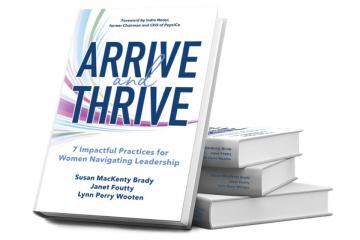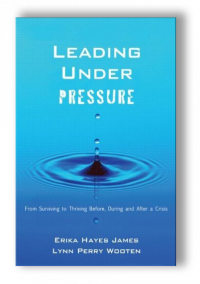Books and Publications
Books
Arrive and Thrive: 7 Impactful Practices for Women Navigating Leadership

The book, published by McGraw Hill is co-authored by Simmons University President Lynn Perry Wooten, Simmons Institute for Inclusive Leadership CEO Susan MacKenty Brady, and Executive Chair of the Board of Deloitte US Janet Foutty.
Arrive and Thrive brings together the lived experience of the three co-authors and their insights from rich careers in business and academia, as well as research and advice from some of the nation’s top leaders, including: Albert Bourla, Chairman & CEO of Pfizer; Anne Chow, CEO of AT&T Business; Carla Harris, Vice Chairman, Managing Director, & Senior Client Advisor, Morgan Stanley; Linda Henry, CEO of the Boston Globe; Natalie Martinez, CEO of Strong Women, Strong Girls; Dr. Richard Safeer, Chief Medical Director of Employee Health and Well-Being, Johns Hopkins Medicine; and Amy Weaver, President and CFO of Salesforce, among others. The guide showcases the power of courage, resilience, and authenticity and highlights seven practices to empower leaders in any stage of their career.
Women currently comprise less than a quarter of middle managers, and that number declines even further each rung up on the corporate ladder. Even women who rise to the level of chief executive often experience higher turnover than their male counterparts do. Arrive and Thrive aims to address these challenges by providing women with the resources, advice, and support they need to not only arrive, but truly thrive as leaders.
Positive Organizing in a Global Society: Understanding and Engaging Differences for Capacity Building and Inclusion

By Laura Morgan Roberts, Lynn Perry Wooten, and Martin N. Davidson.
What happens when thought leaders question longstanding assumptions regarding the most “positive” ways to strengthen diverse organizations? This volume of essays unites the latest research in diversity, inclusion and positive organizational scholarship (POS) to investigate diversity and inclusion dynamics in workplaces, schools, and communities.
Comprised of succinct chapters, this book covers six key areas: authenticity, equity and inclusivity in systems, intersectional identities, relating across differences, resilience, and the role of diversity in innovation. Taken together, the chapters in this book represent a paradigm shift: we step away from a dominant frame of “managing difference,” which problematizes the experience and implications of diversity, and move toward a strengths-based view of diversity as an individual, group, or relational and organizational resource.
Intended to start a conversation, this book features over 30 essays and commentaries from diverse voices in the fields of POS and Diversity and Inclusion. The contributors also offer over 100 practical tips and action recommendations for leaders who seek to bridge diversity, inclusion and POS in areas including: resource cultivation and utilization, boundary-spanning leadership and mentorship, strengths-based development, positive workplace interventions to promote well-being, inclusive strategic planning, and innovation.
From the Center for Positive Organizations.
Leading Under Pressure: From Surviving to Thriving Before, During, and After a Crisis

By Erika Hayes James and Lynn Perry Wooten.
Written primarily for managers and C-suite executives, Leading Under Pressure: From Surviving to Thriving Before, During and After a Crisis, by Erika Hayes James and Lynn Perry Wooten, analyzes major PR crises such as the BP oil spill, the Toyota and Tylenol recalls, and the collapse of the banking industry to explain how to properly manage and lead a company through a crisis situation.
The deep exploration of both successes and failure by companies such as Tylenol, Coca-Cola, Exxon, and the City of New York provide the background to teach managers and C-suite executives how their leadership impacts crisis management and how they can steer the business they’re running away from devastating repercussions.
“Most leaders do not know how to lead during a crisis,” says Lynn Perry Wooten. “We lay out the groundwork. We tell you what you need to do and what the competencies are. Leading Under Pressure fills that gap in executives’ education and experiences.”
Edited from Everything PR.
Book Chapters
James, E and Wooten, L. (forthcoming). The Glass Cliff: African American CEOs as crisis leaders, in Laura Morgan, Anthony Mayo, and David Thomas (eds) Race Work & Leadership: A new perspective on the Black experience. Cambridge, MA: Harvard Business Publishing.
Wooten, L., Polk, S. and Williams, W. (forthcoming). Ujima: Lifting As We Climb to Develop the Next Generation of African American Leaders, in Laura Morgan, Anthony Mayo, and David Thomas (eds) Race Work & Leadership: A new perspective on the Black experience. Cambridge, MA: Harvard Business Publishing.
McCluney, C., Roberts, L. and Wooten, L. (2017), It Takes Courage: Lessons Learned from Starbucks’ #RaceTogether Campaign Case Study in Rob Koonce (ed.) Developing Leaders for Positive Organizing.
Wooten, L. & James, E. (2014). Creating Opportunities from Crisis. How to be a Positive Leader: Insights from Leadings Thinkers on Positive Organizations, Edited by Jane Dutton and Gretchen Spreitzer. San Francisco, CA: Berrett-Koehler Publishers.
Wooten, L., James, E. & Parsons, K. (2013). Leadership Strategies and Tactics for Crisis Management. Handbook of Research on Crisis Leadership, Edited by Andrew J. DuBrin. Northampton, MA: Edward Elgar Publishing.
James, E., Crane, B. & Wooten, L. (2013). Managing the Crisis Lifecycle in the Information Age. Handbook of Research on Crisis Leadership. Edited by Andrew J. DuBrin. Northampton, MA: Edward Elgar Publishing.
Myers, V. & Wooten, L. (2012). Generative Change in Health Care Organizations: From inertia to action in reducing patient disparities. Using a Positive Lens to Explore Social Change and Organizations: Building a Theoretical and Research edited by Karen Golden-Biddle and Jane E. Dutton.
James, E., Dushek, K. & Wooten, L. (2011). Crisis Management: Informing a new leadership agenda. The Academy of Management Annals.
Stavros, J & Wooten, L. (2011). Positive Strategy: Creating Strengths-based Strategy that SOAR. Oxford Handbook of Positive Organizational Scholarship Edited by Kim S. Cameron and Gretchen M. Spreitzer.
James, E. & Wooten, L. (2011). Orientations of Positive Leadership in Times of Crisis. Oxford Handbook of Positive Organizational Scholarship Edited by Kim S. Cameron and Gretchen M. Spreitzer.
Wooten, L. & Cameron, K. (2010). Enablers of a Positive Strategy: Leadership & Culture. The Handbook of Positive Psychology. New York: Oxford University Press.
Roberts, L. & Wooten, L (2008). Exploring African-Americans Fraternities and Sororities Through a Positive Organizing Lens. Our Fight Has Just Begun: The Relevance of Black Fraternities and Sororities in the 21st Century. University of Kentucky Press.
Wooten, L (2006). Framing Crisis Management: A Multiple Lens Perspective: Darden Executive Briefing Series on Crisis Management, Charlottesville, VA: Darden Press, Batten Institute.
Wooten, L. (2004). Creating the Family-Friendly Work Environment: Successful Organizational Strategies for Winning the Battle between Work and Family. The Next Generation Business Handbook; New Strategies from Tomorrow’ Leaders (Ed., Subir Chowdhury). New York: Wiley.
Wooten, L. & Finley-Hervey, J (2004). African-American Women in Academia Burning the Candle at Both Ends: The Organizational Routines and Personal Values Employed for Managing Work-Family Conflict. Building Bridges for Women of Color in Higher Education. Lanham, MD: University Press of American. Research Honorarium from the Sloan Foundation supported this research. Research Briefing, Women in Higher Education.
Journal Articles
Wooten, L (2016). Creating an Organization of Leaders: A Positively Deviant Approach (research briefing). Progress in Pediatrics, 42:41-43.
Tropman, J. & Wooten, L. (2013). The7C approach to conceptualizing administration: Executive leadership in the 21st century. Administration in Social Work, 37(4), 325– 328.
Oguntebi, J., Shcherbakova, M. & Wooten, L. (2012). Applying Diversity Management Concepts to Improve the Minority Educational Pipeline. Decision Sciences Journal of Innovative Education, 10(4) 473-493.
James, E. & Wooten, L. (2011a). Organization Trust amid Crisis: What does it constitute? Effective Executive, 14(1): 10-15.
James, E. & Wooten, L. (2011b). Crisis Leadership: Why it Matters. European Financial Review, December: 60-64.
Rosenberg, V., Wooten, L., McDonald, M. & K. Burton (2010). Building the Bridge for Diversity and Inclusion. Foundation Review 2(2): 100-115.
Tropman, J, & Wooten, L. (2010). Executive Leadership: A 7C Approach: Problems and Perspectives in Management, 8(4): 47-57.
Wooten, L. (2010). Building at Company the Steve Jobs Way: A Positive Deviance Approach to Strategy. Effective Executive, 13(2): 10-15.
Myers, V. & Wooten L. (2009). The Transformational Power of a Mission-Driven Strategy: Extraordinary Diversity Management Practices and Quality of Care. Organizational Dynamics, 38(4): 297-304.
James, E. & Wooten, L. (2009). Leading Teams in Crisis Situations: From Chaos to Extraordinary Performance. Effective Executive 12(5): 14-19.
Root, L & Wooten, L. (2008). Time out for family: Shift work, fathers, and sports. Human Resource Management, 47(3) 481-499.
Wooten, L. & James, E. (2008). Linking Crisis Management and Leadership Competencies: The role of Human Resource Development. Advances in Human Resource Management Development, 10(3): 352-379.
Wooten, L (2007). Leadership in a Crisis Situation: An Opportunity for Framing to Learn.
Human Factor, 2(1): 76-80.
James, E. & Wooten, L. (2006). Diversity Crises: How Firms Manage Discrimination Lawsuits. Academy of Management Journal, 49(6): 1103-1118.
Wooten, L. (2006). Charting a Change Course for Effective Diversity Management. Human Factor, 1(2): 46-53.
James, E. & Wooten, L. (2005). Leadership as (Un)usual: How to Display Competence in Times of Crisis. Organizational Dynamics, 34(2): 141-152.
Yakel, E., Gibbs, T., Ford, B. Wooten, L., Anderson, L., & Scott Ransom (2005). Improving African American Birth Outcomes by Understanding Information Seeking Behavior. African American Research Perspectives, 11(1): 31-47.
Wooten, L. Shultz, C., Ford, B. Anderson, L., Waller, A. & Scott Ransom (2005). Leadership and Prenatal Health Disparities: It Takes a Village. African American Research Perspectives, 11(1): 17-30.
Wooten, L., Parmigiani, A. & Lahiri, N. (2005). C.K. Prahalad’s Passions: Reflections on His Scholarly Journey as a Researcher, Teacher and Management Guru. Journal of Management Inquiry, 14(2): 168-175.
Wooten, L, & James, E. (2005). The Challenges of Organizational Learning to Enable the Disabled: The Perpetuation of Employee Discrimination of the Disabled in the Workplace. Behavioral Sciences and the Law, 23: 123-141.
Wooten, L. & Crane, P. (2004). Generating Dynamic Capabilities through a Humanistic Work Ideology: The case of a certified-nurse midwife practice in a professional bureaucracy. American Behavioral Scientist 47(10): 848-866.
Wooten, L & James, E. (2004). When Firms Fail to Learn: The Perpetuation of Discrimination in the Workplace. Journal of Management Inquiry 13(1): 23-33.
Wooten, L. & Crane, P. Nurses as Implementers of Organizational Culture (2003). Nursing Economics Journal, 21: 275-279.
Wooten, L & Finley-Hervey, J. (2003). Transforming Business Environments: Strategic investments in a family-oriented culture does matter. Business Research Yearbook: Global Business Perspectives, 10: 442: 447.
Wooten, L. & Finley-Hervey, J. (2003). Organizational-level investments in human resource management: Linking the preferences of African-American employees to workplace behavior and feelings. African-American Research Perspectives, 9: 59-69. Research Briefings in Black Issues in Higher Education, GreaterDivesity.com and local Michigan affiliate of National Public Radio.
Wooten, L. (2001). What Makes Women-Friendly Public Accounting Firms Tick? The Diffusion of Human Resource Management Knowledge through Institutional and Resource Pressures. Sex Roles, 45: 277-297.
James, E & Wooten, L. (2001). Managing Diversity: Organizations Failing to Learn from Human Resource Management Mistakes (research briefing). Executive Excellence 18: 17-19.
Perry, L. (1993). Mobilizing Human Energies in Corporate America.” McKinsey International Management, 23: 21-31. Winner of McKinsey Award for Best Paper.
